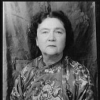Marjorie Kinnan Rawlings

Marjorie Kinnan Rawlings
Marjorie Kinnan Rawlings was an American author who lived in rural Florida and wrote novels with rural themes and settings. Her best known work, The Yearling, about a boy who adopts an orphaned fawn, won a Pulitzer Prize for fiction in 1939 and was later made into a movie of the same name. The book was written long before the concept of young-adult fiction, but is now commonly included in teen-reading lists...
NationalityAmerican
ProfessionAuthor
Date of Birth8 August 1896
CountryUnited States of America
Sift each of us through the great sieve of circumstance and you have a residue, great or small as the case may be, that is the man or the woman.
They were all too tightly bound together, men and women, creatures wild and tame, flowers, fruits and leaves, to ask that any one be spared. As long as the whole continued, the earth could go about its business.
You can't change a man, no-ways. By the time his mummy turns him loose and he takes up with some innocent woman and marries her, he's what he is.
The individual man is transitory, but the pulse of life and of growth goes on after he is gone, buried under a wreath of magnolia leaves.
Now, having left cities behind me, turned Away forever from the strange, gregarious Huddling of men by stones, I find those various Great towns I knew fused into one, burned Together in the fire of my despising...
No man should have proprietary rights over land who does not use that land wisely and lovingly.
Men had reached into the scrub and along its boundaries, had snatched what they could get and had gone away, uneasy in that vast indifferent peace; for a man was nothing, crawling ant-like among the myrtle bushes under the pines. Now they were gone, it was as though they had never been. The silence of the scrub was primordial. The wood-thrush crying across it might have been the first bird in the world-or the last.
A man'll seem like a person to a woman, year in, year out. She'll put up and she'll put up. Then one day he'll do something maybe no worse than what he's been a-doing all his life. She'll look at him. And without no warning he'll look like a varmint.
We cannot live without the Earth or apart from it, and something is shrivelled in a man's heart when he turns away from it and concerns himself only with the affairs of men
A woman never forgets the men she could have had; a man, the women he couldn't
A part of the placidity of the South comes from the sense of well-being that follows the heart-and-body-warming consumption of breads fresh from the oven. We serve cold baker's bread to our enemies, trusting that they will never impose on our hospitality again.
We need above all, I think, a certain remoteness from urban confusion.
the truth is artistically fallacious.
Madness is only a variety of mental nonconformity and we are all individualists here.